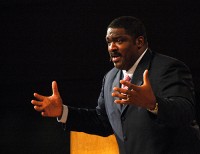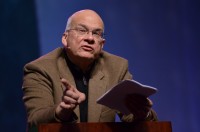


Much of the debate about preaching and teaching today focuses on methodology.
There are debates about expository versus topical preaching, whether women should be allowed to preach, how long the sermon should be, whether the teaching should be participatory or a monologue, how much time should be given to illustration and application, whether to use powerpoint and encourage sermon notes or not, and on and on.
While I have opinions on all of these issues, I am not sure that most of them really matter. All of these arguments over methodology point to an underlying foundational problem: fewer and fewer people live according to a biblical framework. People neither know what the Bible says, nor do they seem to care. Even among most of those who do have Bible knowledge, it seems to make little difference in their lives.
Is More the Answer?
Pastors, priests, and professors are rightly concerned about this problem, and try to correct it. Most of the proposed solutions focus on preaching more or better sermons. Some churches look back at the “Golden Age” of Christianity in the United States—the 1950’s—and notice that pastors preached on Sunday morning, Sunday night, and Wednesday night. So it is believed that more preaching will lead to better Christians, and these pastors move their churches in that direction.
How about Better Preaching?
Another set of pastors—and this group is larger than the first—believes that it is not the quantity of sermons that matters, but the quality. They look at churches today where people know a lot of the Bible, or where a lot of evangelism is getting done, or where the pastors have built a large following, get the sermons aired on the radio or published in books, and decide that these pastors must have figured something out about preaching. So their methods are studied and copied. When they preach, how long they preach, where they preach, what they preach, how they move when they preach, what illustrations they use when they preach, even down to what they wear when they preach is all studied and catalogued and recorded. Every little detail is dissected, analyzed, and copied.
It has gotten to the point now that some pastors have decided that rather than try to copy what the popular pastors do, it is better to just video these pastors, and show these videos in other churches. I have been in church services that do this, and to be honest, if all we need is a professionally delivered sermon from a stage up front to produce fully-devoted followers of Jesus Christ, then the video sermon should be able to do the trick.
All of this is done in the hopes that people will listen, people will learn, and lives will be changed.
Neither seems to be working.
Whether church offer more preaching, or better preaching, neither seems to be “working.” And although there are different ways of defining success when it comes to preaching, no matter which measurement is used, it can be argued that preaching is failing in all of them.
So, what if the problem has nothing to do with the preacher, or how long they preach, or the illustrations they use, or the structure of the sermon, or anything about this at all?
What if the problem is with preaching itself?
What if we don’t need to fine-tune our preaching, but simply discard it? Could it be that preaching is not the cure for biblical illiteracy and apathy, but the cause? Could it be that a dependence upon pastors to provide sermons is what actually led to the widespread ignorance of the Bible in our churches?
If the answer to any of these questions is “Yes,” then what we need is not more preaching, but less. Yet if we preach and teach less, won’t this lead to a rise is the biblical illiteracy of most Christians, which is already at epidemic proportions today? Not necessarily. If properly approached, less preaching and teaching may actually result in a substantial increase in biblical literacy.
We will see how this can be tomorrow.



Most people I know base most of their knowledge of the Bible on what they have heard in sermons. Usually there are glaring holes and lots of ideas that are anything but Biblical. Certain themes and topics seem to get lots of attention and others seem to be totally ignored.
Those who have tried various churches with a variety of theological and Biblical understanding often have a very strange understanding of the Bible.
As you say, sermons have probably contributed to Biblical illiteracy.
Most of the sermons I have heard have been a magnificent waste of everyone’s time.
Sermons would be far more effective (and have a lasting impact) if we went out and tested them in real-life situations. If we put them into practice.
What I see is cookie cutter preachers. Begin with a funny story and preach a feel good sermon when what we all need are sermons that have US all walking closer to GOD. I saw an entertainer say the world (non-Christian) are seeking to be ministered to, while the church wants to be entertained. Most of the time I think pastors are trying to be entertainers instead of PREACHING THE WORD.